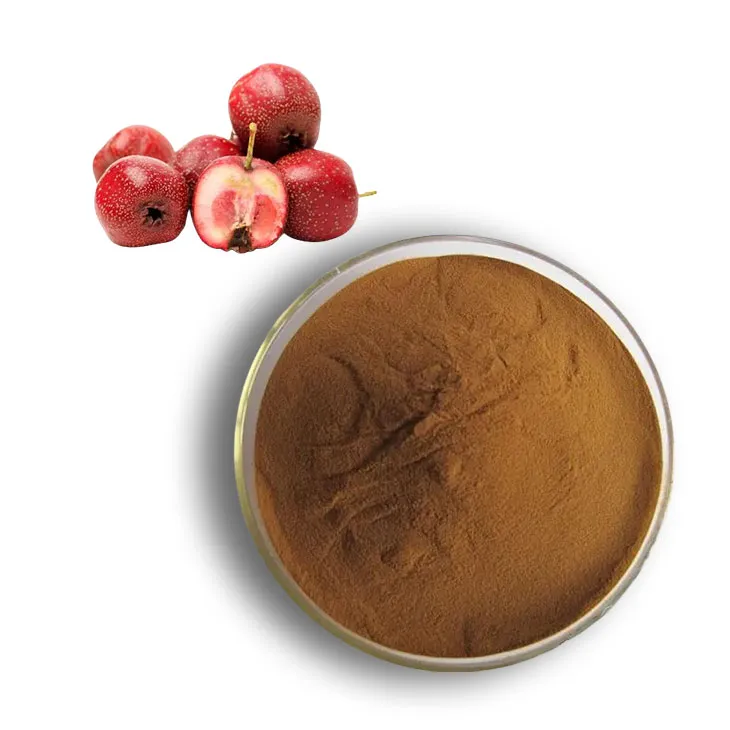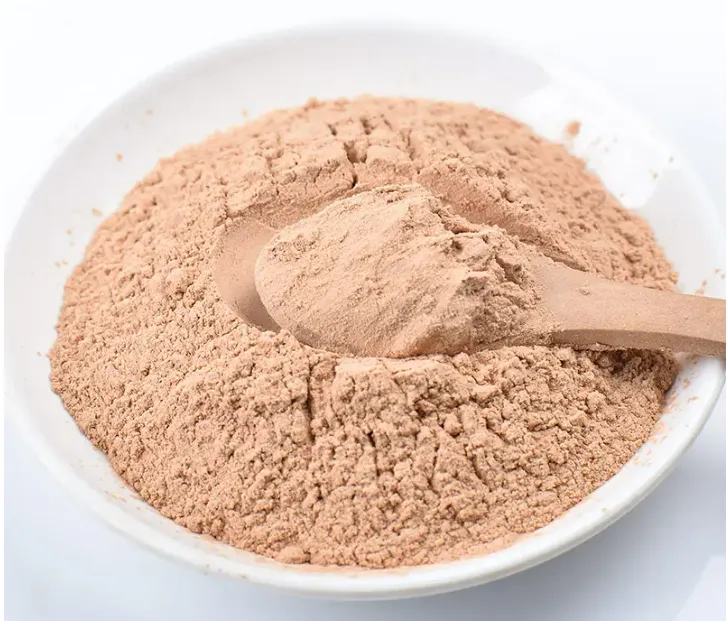- 0086-571-85302990
- sales@greenskybio.com
Hawthorn extract can reduce high blood pressure.
2024-11-13

Introduction
Hypertension, or high blood pressure, is a prevalent health condition that poses significant risks to human health. It is often associated with various cardiovascular diseases, such as heart attacks, strokes, and heart failure. In recent years, natural products have gained increasing attention in the search for effective solutions to manage hypertension. Hawthorn Extract is one such natural product that shows great promise in this regard.

Components of Hawthorn Extract
Hawthorn Extract contains several bioactive components that contribute to its potential in reducing hypertension.
Flavonoids
Flavonoids are a major group of compounds found in hawthorn extract. They possess antioxidative and anti - inflammatory properties. Antioxidative activity is crucial as it helps to combat oxidative stress in the body. Oxidative stress can damage blood vessels, leading to endothelial dysfunction, which is often associated with hypertension. By neutralizing free radicals, flavonoids protect the blood vessels from oxidative damage. Moreover, their anti - inflammatory effects play a role in reducing inflammation within the blood vessels. Inflammation can cause constriction of blood vessels and increase in blood pressure. Flavonoids can inhibit the production of inflammatory mediators, thus promoting healthy blood vessel function.
Triterpenic Acids
Triterpenic acids are another important component of hawthorn extract. These acids are beneficial in dealing with lipid - related issues associated with high blood pressure. High levels of lipids, such as cholesterol and triglycerides, can accumulate in the blood vessels, leading to atherosclerosis. Atherosclerotic plaques can narrow the blood vessels and increase blood pressure. Triterpenic acids can help regulate lipid metabolism. They may interfere with the absorption of dietary lipids in the intestine, promote the breakdown of lipids in the liver, and enhance the excretion of lipids from the body. By improving lipid profiles, triterpenic acids contribute to the prevention and management of hypertension.

Animal Studies
Animal studies have provided valuable insights into the effects of hawthorn extract on blood pressure - related mechanisms.
- In rodent models of hypertension, hawthorn extract has been shown to reduce blood pressure. For example, in spontaneously hypertensive rats (SHR), administration of hawthorn extract over a certain period led to a significant decrease in systolic and diastolic blood pressure. This was accompanied by improvements in vascular function. The extract was found to enhance the production of nitric oxide (NO) in the blood vessels. NO is a vasodilator, which means it relaxes the smooth muscle cells in the blood vessel walls, thereby increasing the diameter of the blood vessels and reducing blood pressure.
- Another study in animals with diet - induced obesity and hypertension demonstrated that hawthorn extract could reverse some of the adverse effects on the cardiovascular system. It reduced oxidative stress markers in the blood vessels and improved endothelial function. The animals treated with hawthorn extract showed less thickening of the blood vessel walls, which is an important factor in preventing hypertension - related complications.

Human Studies
Human studies on hawthorn extract and hypertension have also been carried out, although more research is still needed.
- In some small - scale clinical trials, hypertensive patients who were given hawthorn extract supplements showed a trend towards lower blood pressure. For example, in a trial involving a group of mild - to - moderate hypertensive patients, after several weeks of taking hawthorn extract capsules, there was a reduction in both systolic and diastolic blood pressure compared to the placebo group. However, the changes were not always statistically significant, which may be due to the relatively small sample size and short duration of the study.
- Some observational studies have also suggested a potential benefit of hawthorn extract in hypertensive patients. These studies found that patients who regularly consumed hawthorn - containing products (such as hawthorn tea or hawthorn - based herbal mixtures) had a lower prevalence of hypertension - related symptoms, such as headache, dizziness, and shortness of breath. Although these are not direct measurements of blood pressure, they indicate that hawthorn extract may have a positive impact on the overall well - being of hypertensive patients.
Mechanisms of Action in Humans
Understanding the mechanisms of action of hawthorn extract in humans is crucial for its potential use in hypertension management.
- One possible mechanism is through its effect on the renin - angiotensin - aldosterone system (RAAS). The RAAS plays a central role in blood pressure regulation. Hawthorn extract may interfere with the production or activity of components in the RAAS, such as inhibiting the release of renin. Renin is an enzyme that initiates a cascade of reactions leading to the production of angiotensin II, a potent vasoconstrictor. By reducing the activity of the RAAS, hawthorn extract can promote vasodilation and lower blood pressure.
- Another mechanism is related to its impact on the sympathetic nervous system. The sympathetic nervous system can increase blood pressure through various mechanisms, such as increasing heart rate and constricting blood vessels. Hawthorn extract may have a modulating effect on the sympathetic nervous system, reducing its overactivity. This can lead to a decrease in heart rate and relaxation of blood vessels, ultimately resulting in a reduction in blood pressure.
- Hawthorn extract may also improve the function of cardiomyocytes (heart muscle cells). In hypertensive patients, the heart often has to work harder to pump blood against increased resistance in the blood vessels. By enhancing the function of cardiomyocytes, hawthorn extract can improve the efficiency of the heart's pumping action. This can reduce the strain on the heart and potentially contribute to blood pressure reduction.
Dosage and Safety
When considering the use of hawthorn extract for hypertension, dosage and safety are important aspects.
- Regarding dosage, different forms of hawthorn extract may have different recommended dosages. In general, for dried hawthorn fruit extract, a common dosage range is around 1 - 2 grams per day. However, it is important to note that these dosages should be adjusted according to individual factors such as age, body weight, and the severity of hypertension. It is always advisable to consult a healthcare professional before starting any supplementation.
- In terms of safety, hawthorn extract is generally considered safe for most people when used appropriately. However, it may interact with certain medications. For example, it may potentiate the effects of some antihypertensive drugs. Therefore, patients who are taking other medications for hypertension or other conditions should inform their doctor if they plan to use hawthorn extract. Additionally, some people may experience mild side effects such as digestive discomfort or allergic reactions, although these are relatively rare.
Conclusion
Hawthorn extract shows potential in reducing high blood pressure through its various bioactive components and mechanisms of action. The flavonoids and triterpenic acids in hawthorn extract play important roles in protecting blood vessels, regulating lipid metabolism, and reducing oxidative stress and inflammation. Animal studies have demonstrated its effects on blood pressure - related mechanisms, and human studies have preliminarily shown its positive influence on hypertensive patients. However, more research is needed to fully understand its efficacy, optimal dosage, and long - term safety. With further investigation, hawthorn extract may become a valuable addition to the arsenal of natural products for the management of hypertension.
FAQ:
What are the main components in hawthorn extract that can reduce high blood pressure?
The main components in hawthorn extract that can reduce high blood pressure are flavonoids and triterpenic acids. Flavonoids are antioxidative and anti - inflammatory, which are beneficial for blood vessels. Triterpenic acids help with lipid - related issues associated with high blood pressure.
How do flavonoids in hawthorn extract affect blood pressure?
Flavonoids in hawthorn extract are antioxidative and anti - inflammatory. These properties are beneficial for blood vessels. By protecting and improving the function of blood vessels, they can contribute to the reduction of high blood pressure.
What evidence is there from animal studies regarding hawthorn extract and blood pressure?
Animal studies have proven hawthorn extract's effects on blood pressure - related mechanisms. However, specific details may vary depending on different experimental setups and animal models used in these studies.
What have human studies shown about the effect of hawthorn extract on hypertensive patients?
Human studies have preliminarily shown its positive influence on hypertensive patients. But more extensive and in - depth research is still needed to fully understand the extent of its effectiveness and safety in treating hypertension in humans.
Are there any potential side effects of using hawthorn extract to reduce blood pressure?
While hawthorn extract shows promise in reducing blood pressure, potential side effects may exist. However, current research on this aspect is not comprehensive enough. Some people may experience mild digestive discomfort, but in general, more research is required to accurately define and understand all potential side effects.
Related literature
- The Effects of Hawthorn Extract on Cardiovascular Health"
- "Hawthorn Extract: A Promising Natural Remedy for Hypertension"
- "Mechanisms of Hawthorn Extract in Blood Pressure Regulation"
- ▶ Hesperidin
- ▶ Citrus Bioflavonoids
- ▶ Plant Extract
- ▶ lycopene
- ▶ Diosmin
- ▶ Grape seed extract
- ▶ Sea buckthorn Juice Powder
- ▶ Fruit Juice Powder
- ▶ Hops Extract
- ▶ Artichoke Extract
- ▶ Mushroom extract
- ▶ Astaxanthin
- ▶ Green Tea Extract
- ▶ Curcumin
- ▶ Horse Chestnut Extract
- ▶ Other Product
- ▶ Boswellia Serrata Extract
- ▶ Resveratrol
- ▶ Marigold Extract
- ▶ Grape Leaf Extract
- ▶ New Product
- ▶ Aminolevulinic acid
- ▶ Cranberry Extract
- ▶ Red Yeast Rice
- ▶ Red Wine Extract
-
Hawthorn Extract
2024-11-13
-
Horse Chestnut Extract
2024-11-13
-
Avocado Extract Powder
2024-11-13
-
Mangosteen extract powder
2024-11-13
-
Thunder God Vine Extract
2024-11-13
-
Okra Extract
2024-11-13
-
Citrus bioflavonoids
2024-11-13
-
Mulberry leaf Extract
2024-11-13
-
Bamboo Leaf extract
2024-11-13
-
Baicalin
2024-11-13




















